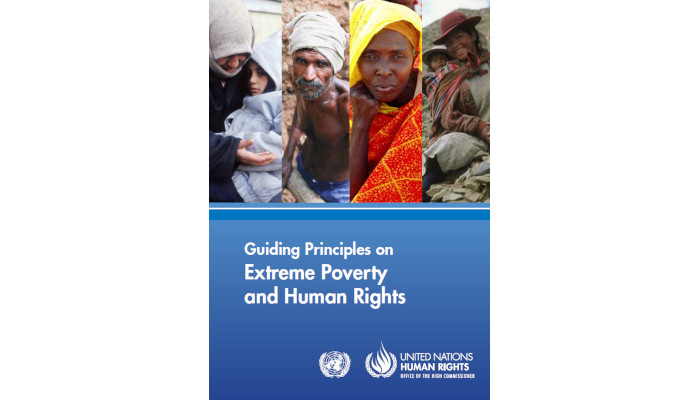UN Guiding Principles on Extreme Poverty and Human Rights – A Useful Tool to Use

Extreme poverty constitutes a violation of human rights. This seemingly obvious statement was not apparent to many key policy players and lawmakers for many years, who instead considered poverty in all of its forms to be the result of economic underdevelopment. This has changed with the adoption of the UN Guiding Principles on Extreme Poverty and Human Rights in 2012.
The Guiding Principles were adopted at the United Nations Human Rights Council after long years of effort and discussions. ATD Fourth World, led by Joseph Wresinski, played a significant role, eventually leading to its adoption. Among other things, ATD Fourth World organised a consultation of the Guiding Principles – before they were adopted – with people experiencing poverty.
Although adopting the Guiding Principles was an important step in changing the way people thought about extreme poverty (as a violation of human rights), it was also a first step towards improving the legal situation of people experiencing poverty. To answer the question of why this is the first step, we need to talk about what the Guiding Principles are from a legal perspective. Basically speaking, legal acts can be divided into two types. The first is legally binding – this is known as hard law. The second is non-binding – this is known as soft law. The difference between the two is that the first must be respected by public authorities (hence the word hard law), while they may or may not have to comply with the second one. The Guiding Principles fall into the latter category.
While the Guiding Principles are based on several legally binding international human rights conventions, they do not in themselves create a new right in the form of freedom from poverty or freedom from socio-economic discrimination.
The Guiding Principles are a kind of guide on how to interpret existing agreements from the perspective of the rights of people affected by poverty.
In the case of the creation of new human rights standards, we can very often observe that, in the first instance, the acts adopted have a legally non-binding form, only to take the form of binding legal acts in the end. This can be seen in the case of similar human rights acts, which are the UN Guiding Principles on Business and Human Rights, where the road towards a binding treaty has already begun.
For such a process to happen, the Guiding Principles must be a living instrument that lawmakers in individual countries, politicians, activists, and others reach for. Is this the case with the Guiding Principles? ATD Fourth World ally, Dr Adam Ploszka, tried to answer this question in a recently published article titled: All Beginnings are Difficult: The Guiding Principles on Extreme Poverty and Human Rights a Decade After Their Adoption.
From this research, which ATD members Janet Nelson Arazi and Sébastien Gotti helped to conduct, the sad conclusion appears to be that the Guiding Principles so far have limited practical relevance. Very few countries are using them, and some countries – for various reasons – are against the Guiding Principles. Neither do the various organs of the UN system attribute much importance to them. Much more popular than talking about the rights of the people living in poverty is the discussion of Sustainable Development Goals, which, unlike the Guiding Principles, do not put the person experiencing poverty at the centre.
It has been more ten years since the Guiding Principles were adopted. It is high time to start claiming the human rights of people living in extreme poverty through them. We showed how to do this at ATD some time ago.
We have prepared a handbook to help you do this with outside partners. This handbook is available here: Making Human Rights Work for People Living in Extreme Poverty: A Handbook for Implementing the UN Guiding Principles on Extreme Poverty and Human Rights (2015). This publication shows by using the Guiding Principles, we can invoke human rights in dialogue with public authorities and other civil society actors.
It is worth recalling why it is important to refer to human rights in this dialogue. Human Rights, by their very nature, have an accountability mechanism. With this in mind, the activities of state authorities, which give support to those living in poverty, cease to be merely acts of optional charity. From the human rights perspective, the support given to people living in poverty is an obligation, the implementation of which stems from constitutions and international agreements that are binding on the states. It is therefore more difficult for authorities to refuse to act when we address them in the language of human rights.

